Papers by Irina Trubitsyna
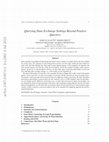
arXiv (Cornell University), Jul 6, 2023
Data exchange, the problem of transferring data from a source schema to a target schema, has been... more Data exchange, the problem of transferring data from a source schema to a target schema, has been studied for several years. The semantics of answering positive queries over the target schema has been defined in early work, but little attention has been paid to more general queries. A few proposals of semantics for more general queries exist but they either do not properly extend the standard semantics under positive queries, giving rise to counterintuitive answers, or they make query answering undecidable even for the most important data exchange settings, e.g., with weakly-acyclic dependencies. The goal of this paper is to provide a new semantics for data exchange that is able to deal with general queries. At the same time, we want our semantics to coincide with the classical one when focusing on positive queries, and to not trade-off too much in terms of complexity of query answering. We show that query answering is undecidable in general under the new semantics, but it is coNP-complete when the dependencies are weakly-acyclic. Moreover, in the latter case, we show that exact answers under our semantics can be computed by means of logic programs with choice, thus exploiting existing efficient systems. For more efficient computations, we also show that our semantics allows for the construction of a representative target instance, similar in spirit to a universal solution, that can be exploited for computing approximate answers in polynomial time.
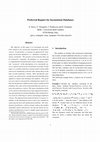
IGI Global eBooks, Jan 18, 2011
The objective of this paper is to investigate the problems related to the extensional integration... more The objective of this paper is to investigate the problems related to the extensional integration of information sources. In particular, we propose an approach for managing inconsistent databases, i.e. databases violating integrity constraints. The presence of inconsistent data can be resolved by "repairing" the database, i.e. by providing a computational mechanism that ensures obtaining consistent "scenarios" of the information or by consistently answer to queries posed on an inconsistent set of data. In this paper we consider preferences among repairs and possible answers by introducing a partial order among them on the base of some preference criteria. More specifically, preferences are expressed by considering polynomial functions applied to repairs and returning real numbers. The goodness of a repair is measured by estimating how much it violates the desiderata conditions and a repair is preferred if it minimizes the value of the polynomial function used to express the preference criteria. The main contribution of this work consists in the proposal of a logic approach for querying and repairing inconsistent databases that extends previous works by aallowing to express and manage preference criteria. The approach here proposed allows to express reliability on the information sources and is also suitable for expressing decision and optimization problems. The introduction of preference criteria strongly reduces the number of feasible repairs and answers; for special classes of constraints and functions it gives a unique repair and answer. £ Work partially supported by a MURST grants under the projects "D2I" and "Sistemi informatici Integrati a supporto di bench-marking di progetti ed interventi ad innovazione tecnologica in campo agro-alimentare". The first author is also supported by ICAR-CNR.
Artificial Intelligence, Oct 1, 2023
Intelligent systems with applications, Feb 1, 2023
Theoretical Computer Science, Oct 1, 2022
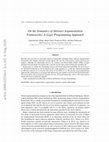
arXiv (Cornell University), Aug 6, 2020
Recently there has been an increasing interest in frameworks extending Dung's abstract Argumentat... more Recently there has been an increasing interest in frameworks extending Dung's abstract Argumentation Framework (AF). Popular extensions include bipolar AFs and AFs with recursive attacks and necessary supports. Although the relationships between AF semantics and Partial Stable Models (PSMs) of logic programs has been deeply investigated, this is not the case for more general frameworks extending AF. In this paper we explore the relationships between AF-based frameworks and PSMs. We show that every AF-based framework ∆ can be translated into a logic program P∆ so that the extensions prescribed by different semantics of ∆ coincide with subsets of the PSMs of P∆. We provide a logic programming approach that characterizes, in an elegant and uniform way, the semantics of several AF-based frameworks. This result allows also to define the semantics for new AF-based frameworks, such as AFs with recursive attacks and recursive deductive supports. Under consideration for publication in Theory and Practice of Logic Programming.
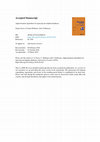
Information Systems, Dec 1, 2019
Certain answers are a widely accepted semantics of query answering over incomplete databases. As ... more Certain answers are a widely accepted semantics of query answering over incomplete databases. As their computation is a coNP-hard problem, recent research has focused on developing (polynomial time) evaluation algorithms with correctness guarantees, that is, techniques computing a sound but possibly incomplete set of certain answers. The aim is to make the computation of certain answers feasible in practice, settling for under-approximations. In this paper, we present novel evaluation algorithms with correctness guarantees, which provide better approximations than current techniques, while retaining polynomial time data complexity. The central tools of our approach are conditional tables and the conditional evaluation of queries. We propose different strategies to evaluate conditions, leading to different approximation algorithms-more accurate evaluation strategies have higher running times, but they pay off with more certain answers being returned. Thus, our approach offers a suite of approximation algorithms enabling users to choose the technique that best meets their needs in terms of balance between efficiency and quality of the results.

In recent years there has been an increasing interest in extending Dung's framework to facili... more In recent years there has been an increasing interest in extending Dung's framework to facilitate the knowledge representation and reasoning process. In this paper, we present an extension of Argumentation Framework (AF) that allows for the representation of preferences over arguments' truth values (3-valued preferences). For instance, we can express a preference stating that extensions where argument a is false (i.e. defeated) are preferred to extensions where argument b is false. Interestingly, such a framework generalizes the well-known Preference-based AF with no additional cost in terms of computational complexity for most of the classical argumentation semantics. Then, we further extend AF by considering both (3-valued) preferences and 3-valued constraints, that is constraints of the form \varphi \Rightarrow v or v \Rightarrow \varphi, where \varphi is a logical formula and v is a 3-valued truth value. After investigating the complexity of the resulting framework,as both constraints and preferences may represent subjective knowledge of agents, we extend our framework by considering multiple agents and study the complexity of deciding acceptance of arguments in this context.
24th Italian Symposium on Advanced Database Systems, SEBD 2016, Ugento, Lecce, Italy, June 19-22, 2016, Ugento, Lecce, Italia, June 19-22, 2016
Certain answers are a widely accepted semantics of query answering over incomplete databases. Sin... more Certain answers are a widely accepted semantics of query answering over incomplete databases. Since their computation is a coNP-hard problem, recent research has focused on developing evaluation algorithms with correctness guarantees, that is, techniques computing a sound but possibly incomplete set of certain answers. In this paper, we show how novel evaluation algorithms with correctness guarantees can be developed leveraging conditional tables and the conditional evaluation of queries, while retaining polynomial time data complexity.
Recently there has been an increasing interest in probabilistic abstract argumentation, an extens... more Recently there has been an increasing interest in probabilistic abstract argumentation, an extension of Dung's abstract argumentation framework with probability theory. In this setting, we address the problem of computing the probability that a given argument is accepted. This is carried out by introducing the concept of probabilistic explanation for a given (probabilistic) extension. We show that the complexity of the problem is FP #P-hard and propose polynomial approximation algorithms with bounded additive error for probabilistic argumentation frameworks where odd-length cycles are forbidden. This is quite surprising since, as we show, such kind of approximation algorithm does not exist for the related FP #Phard problem of computing the probability of the credulous acceptance of an argument, even for the special class of argumentation frameworks considered in the paper.
Certain answers are a widely accepted semantics of query answering over incomplete databases. Sin... more Certain answers are a widely accepted semantics of query answering over incomplete databases. Since their computation is a coNP-hard problem, recent research has focused on developing evaluation algorithms with correctness guarantees, that is, techniques computing a sound but possibly incomplete set of certain answers. In this paper, we show how novel evaluation algorithms with correctness guarantees can be developed leveraging conditional tables and the conditional evaluation of queries, while retaining polynomial time data complexity.
Theory and Practice of Logic Programming, Aug 15, 2023
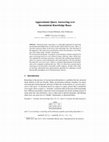
Consistent query answering is a principled approach for querying inconsistent knowledge bases. It... more Consistent query answering is a principled approach for querying inconsistent knowledge bases. It relies on the central notion of repair, that is, a maximal consistent subset of the facts in the knowledge base. One drawback of this approach is that entire facts are deleted to resolve inconsistency, even if they may still contain useful "reliable" information. To overcome this limitation, we propose an inconsistency-tolerant semantics for query answering based on a new notion of repair, allowing values within facts to be updated for restoring consistency. This more fine-grained repair primitive allows us to preserve more information in the knowledge base. We also introduce the notion of a universal repair, which is a compact representation of all repairs and can be computed in polynomial time. Then, we show that consistent query answering in our framework is intractable (coNP-complete). In light of this result, we develop a polynomial time approximation algorithm for computing a sound (but possibly incomplete) set of consistent query answers.
SEBD, 2014
Enriching Datalog with function symbols makes modeling easier, increases the expressive power, an... more Enriching Datalog with function symbols makes modeling easier, increases the expressive power, and allows us to deal with infinite domains. However, this comes at a cost: common inference tasks become undecidable. To cope with this issue, recent research has focused on finding trade-offs between expressivity and decidability by identifying classes of Datalog programs allowing only a limited use of function symbols but guaranteeing decidability of common inference tasks. In this paper, we provide a survey of current termination criteria, which define conditions guaranteeing that a Datalog program (possibly with function symbols) has a finite number of stable models, each of them is of finite size and can be computed. We also present a technique which can be used in conjunction with current termination criteria to improve them.
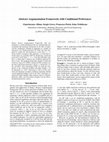
Proceedings of the ... AAAI Conference on Artificial Intelligence, Jun 26, 2023
Dung's abstract Argumentation Framework (AF) has emerged as a central formalism in the area of kn... more Dung's abstract Argumentation Framework (AF) has emerged as a central formalism in the area of knowledge representation and reasoning. Preferences in AF allow to represent the comparative strength of arguments in a simple yet expressive way. Preference-based AF (PAF) has been proposed to extend AF with preferences of the form a > b, whose intuitive meaning is that argument a is better than b. In this paper we generalize PAF by introducing conditional preferences of the form a > b ← body that informally state that a is better than b whenever the condition expressed by body is true. The resulting framework, namely Conditional Preference-based AF (CPAF), extends the PAF semantics under three well-known preference criteria, i.e. democratic, elitist, and KTV. After introducing CPAF, we study the complexity of the verification problem (deciding whether a set of arguments is a "best" extension) as well as of the credulous and skeptical acceptance problems (deciding whether a given argument belongs to any or all "best" extensions, respectively) under multiple-status semantics (that is, complete, preferred, stable, and semi-stable semantics) for the abovementioned preference criteria.
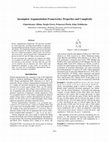
Proceedings of the ... AAAI Conference on Artificial Intelligence, Jun 28, 2022
Dung's Argumentation Framework (AF) has been extended in several directions, including the possib... more Dung's Argumentation Framework (AF) has been extended in several directions, including the possibility of representing unquantified uncertainty about the existence of arguments and attacks. The framework resulting from such an extension is called incomplete AF (iAF). In this paper, we first introduce three new satisfaction problems named totality, determinism and functionality, and investigate their computational complexity for both AF and iAF under several semantics. We also investigate the complexity of credulous and skeptical acceptance in iAF under semi-stable semantics-a problem left open in the literature. We then show that any iAF can be rewritten into an equivalent one where either only (unattacked) arguments or only attacks are uncertain. Finally, we relate iAF to probabilistic argumentation framework, where uncertainty is quantified.
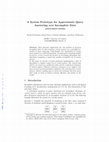
Many database applications face the problem of querying incomplete data. In such scenarios, certa... more Many database applications face the problem of querying incomplete data. In such scenarios, certain answers are a principled semantics of query answering. Unfortunately, the computation of certain query answers is a coNP-hard problem. To make query answering feasible in practice, recent research has focused on developing polynomial time algorithms computing a sound (but possibly incomplete) set of certain answers. In this paper we present a system prototype implementing a suite of algorithms to compute sound sets of certain answers. The central tools used by our system are conditional tables and the conditional evaluation of relation algebra. Different evaluation strategies can be applied, with more accurate ones having higher complexity, but returning more certain answers, thereby enabling users to choose the technique that best meets their needs in terms of balance between efficiency and quality of the results.

Uploads
Papers by Irina Trubitsyna